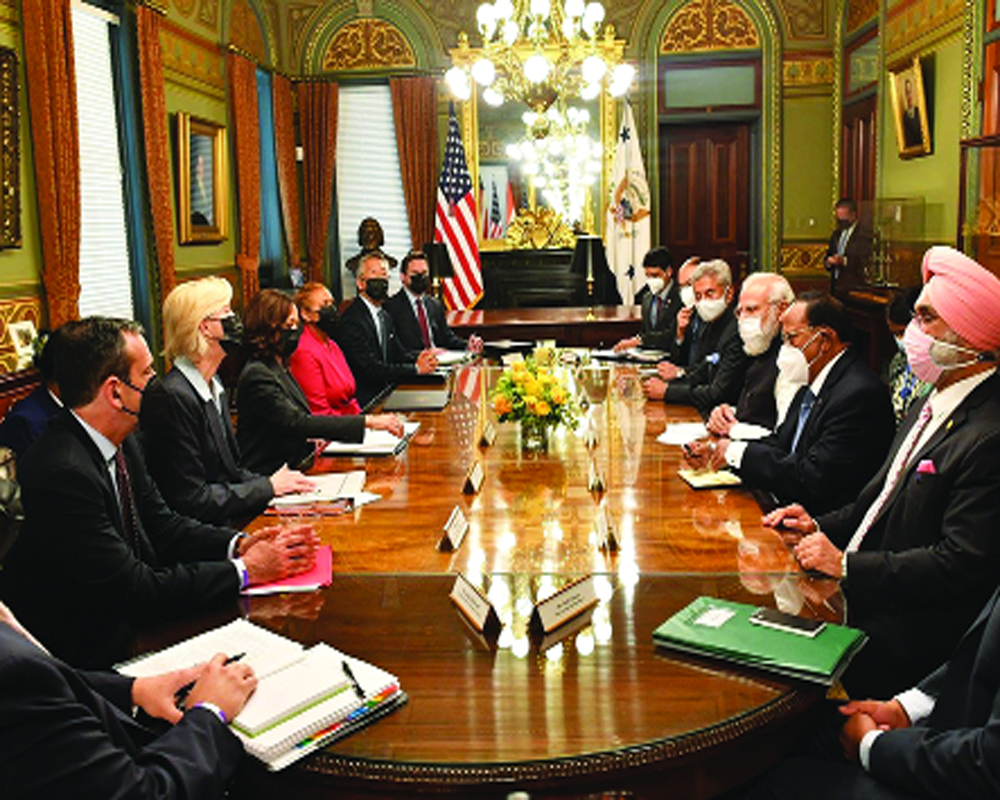Economic development is a complex matter. The Government alone cannot make it happen but needs the involvement of all — businesses and the public
The visit of Prime Minister Narendra Modi to the US has tried to kindle hopes in an economy that needs investment but the American companies have not yet given any firm commitment to him. He held meetings with five global CEOs for potential investments.
India has taken many steps to bring in reforms through an asset reconstruction construction company (ARC) or the bad bank, lower interest rates, networked businesses and chain of roads. Companies like Qualcomm have investments in wireless modem, digital media networking, dairy transportation and defence. Now Modi has suggested to them to invest in hi-tech sectors and in measures to strengthen innovation ecosystem. General Atomics, which opened its first office in India in 2018, is making significant contributions to deepen India-US defence and security cooperation. It is working with both governments to provide India with the latest defence systems.
Investments in real estate too are always lucrative. Blackstone has so far invested $15 billion in real estate, private equity, real estate, education, fashion, packaging and housing finance. It would continue to do so as per the assurance of its CEO Stephen Schwarzman.
Blackstone Real Estate Fund is said to be the largest owner of commercial real estate in India. The company played a key role in launching India’s first real estate investment trust (REIT) along with its partner Embassy Group in 2019 and has since then launched two REITs in the country.
The Quad is a symbolic multilateral body. It provides a platform to seek cooperation from like-minded countries on issues like ensuring respect for territorial integrity, sovereignty and peaceful resolution of disputes. Quad leaders agreed to scale up collective strategic cooperation.
There may be gains in the future. As of now, there are only expectations amid not-a so-good domestic economic situation. The country’s non-performing assets have increased. Steps like taming inflation, the Insolvency and Bankruptcy Act, Real Estate Regulatory Act, and GST did not add to the desired growth. These have shaken the system and market confidence. The rules are more stringent and do not help the people. The foreign investors though keen to invest may also have apprehensions, which the scrapping of the retrospective taxation may partially help resolve.
Corporate tax rates were cut but it ignored the pivot the individual. His taxes peaked during 2019. It hit the basic capacity of the individual to ride through a crisis like the Covid-19 pandemic situation. At 42 per cent plus various cesses, India has the highest tax rates. The gestures by foreign countries would not be enough to bring that confidence back. It would be welcome even now to cut the income tax rates. It would boost the individual's capabilities and benefit the whole economy as the individual consumes more.
The lower interest rate is playing havoc along with tax deductions on deposit hedging against inflation that interest accrual does. It affects the developmental process. To accelerate development, the interest rates must be lowered. Economic development is a complex matter. The government on its own cannot make it happen. It needs the involvement of all — businesses and the public in their various spheres of activity. The country needs to ponder how the entire system is revamped.
The new ARC or the bad bank with the limited government guarantee will remove Rs22.14 lakh crore ($30 billion) of NPAs from the system. Since now it will be now under one entity resolution would be easier, it is being said. Bad bank is not all virtue.
The world experience with bad banks is that they have excessive and hidden fees, bouncing cheques, expensive debits, big banking errors and failure to honour promises. It can create a new kind of market in dealing with stressed loans but there are apprehensions that asset buyers may resort to harsh unethical methods.
In a difficult situation, new methods are inevitably tried out but it has to be remembered that all Euro-US models of capital market should not be copied as the financial literacy is poor here. Moreover, Indian society is far more complex and heterogeneous. A complicated system may not be a proper solution. Hiving off bad assets may be practical but settling or reselling those for realization of dues is not easy and would have many complications as each of the cases are different. True, the nation will chart out its course. Setting the new course is not easy and none as of now has a clear idea how it would function.
(The writer is a senior journalist. The views expressed are personal.)


























